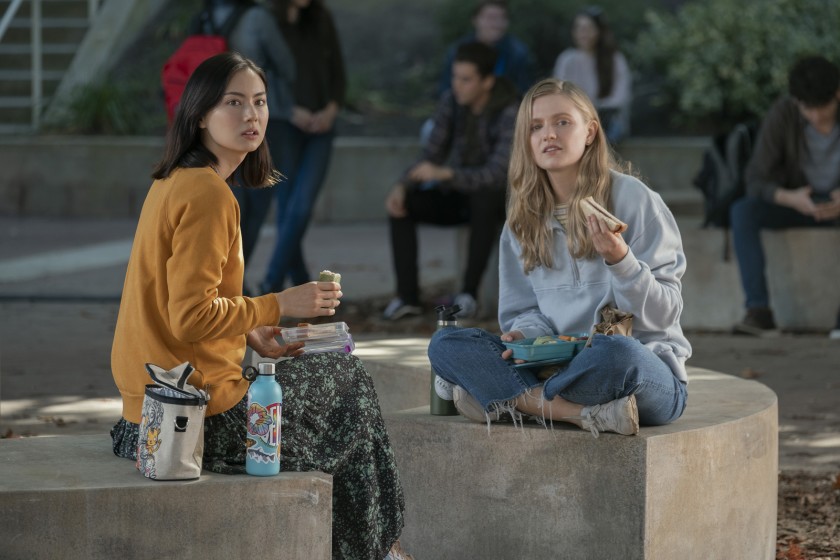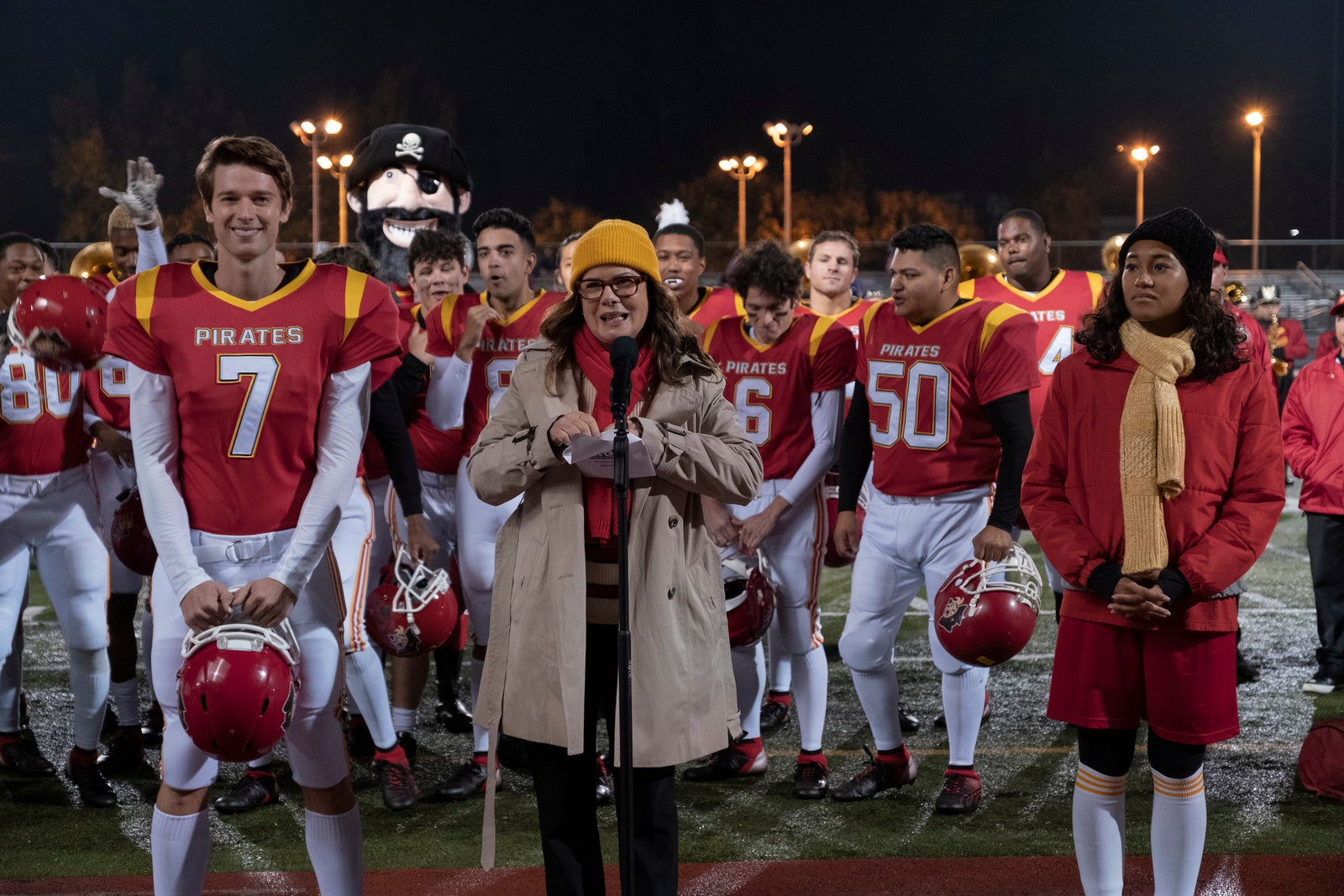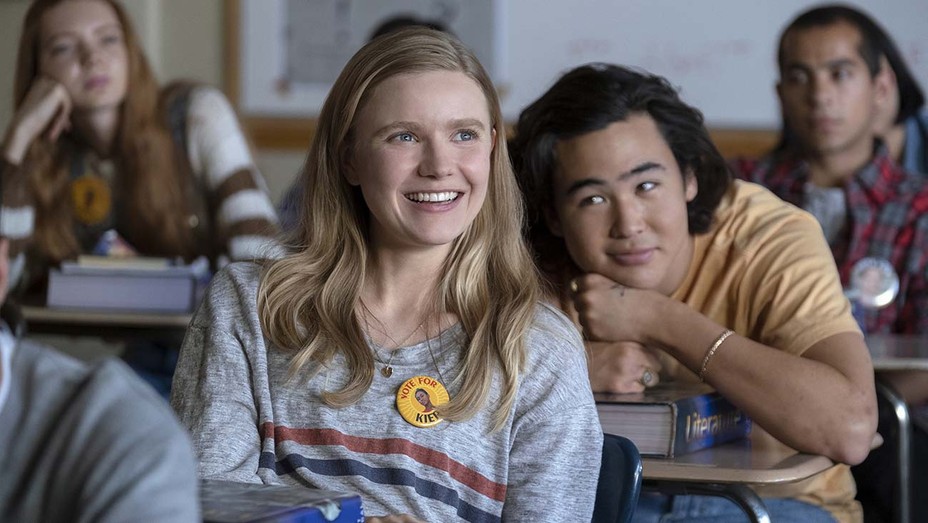“Moxie” is a now-antiquated term that refers to a certain enlivening spark some people have, which causes them to assert themselves, challenge the status quo, and generally bring energy and unpredictability to anything they do. (It’s also the name of a defunct American soft drink that tastes halfway between root beer and dirt, but that’s not important right now.) You might have heard it in an old black-and-white movie, where some grizzled newspaper editor told a young reporter “You got moxie, kid.”
What it isn’t is a particularly good descriptor for Amy Poehler’s new Netflix movie that bears its name. Oh, it’s supposed to mean all those things, but in Poehler’s hands, it’s too limp and facile. Moxie is the second film Poehler’s directed after her first film for Netflix, Wine Country, which didn’t have much moxie either. She’s got moxie as a performer, particularly her character Joy from Inside Out, who was moxie incarnate. As a filmmaker, though, Poehler doesn’t have the same effervescence that either the 1940s newspaper editor compliment, or the old soft drink, once had.
That’s a shame, because the movie’s message of female empowerment deserves an approach that is far less conventional. Female empowerment has itself become sort of a conventional goal for mainstream films, as more and more films strive to be progressive on gender representation, and all other types of representation. Just because every white male studio executive is now trying to kowtow to his most woke critics, though, does not mean that female empowerment itself needs to become a bland, dismissible motivation for making a movie. You can celebrate what Moxie is trying to do while still recognising its failure to do it.
Vivian (Hadley Robinson) is probably how Poehler imagined herself as a teenager. Poehler didn’t have a hand in the script, which was written by Tamara Chestna and Dylan Meyer, but she does play Vivian’s mother in the film. And in her younger years, the character thumbed her nose at the establishment and favoured bands like Bikini Kill, who were central to the “riot grrrrl” movement of the early 1990s.
Her daughter may be following in her footsteps. Having bristled at the sexist treatment of other girls at her high school, as well as finding a box of her mother’s old zines and collages and writings, Vivian decides to release her own anonymous zine, calling out the sins of the patriarchy as embodied by the popular jocks and other douchebags. The zine becomes a sensation and prompts considerable speculation about its origins. Vivian decides to stay behind the curtain, though, and watches as her friends adopt the zine’s core principles, with only the slightest hints of a smile to give away her own involvement.
Good intentions require good execution to bear fruit, though. Moxie paints in broad strokes that are indebted to the predictable dynamics of high school coming-of-age movies from time immemorial. The captain of the football team has been king jerk in so many of these movies that the sheer staleness of the trope distracts us from what Poehler and the writers are trying to do. (That he’s played by Patrick Schwarzenegger is also a bit of a distraction, as you ponder the similarity of the bone structure of his and his famous dad’s faces.) Calling out the more insidious ways the patriarchy infects everything it touches would be far more effective than focusing energy on a character type who’s been a cinematic punching bag for four decades, and is already persona non grata in today’s climate. This guy even spits in the soda of a new girl (Alycia Pascual-Pena) who dares to challenge him, a detail that’s strange not only because it doesn’t follow a recognisable pattern of behaviour for handsome jocks in the 21st century, but because it crosses racial and gender barriers that take it out of the realm of same-gender bullying and into the realm of a hate crime.
The young women who follow Vivian’s lead are slightly more originally conceived, but are not a surprise either in the context of the Hollywood’s recent turn toward inclusivity. In addition to having an array of cultural backgrounds represented, Moxie also includes a trans character, played by trans actress Josie Totah. That would be really worth cheering if she were given something to do, as she was in the underseen drama Other People from 2016, where she stole scenes with her firecracker charisma – dare I say “moxie.” She’s barely given three lines of dialogue here. It’s a perfect example of the way this movie crosses i’s and dots t’s but doesn’t flesh anything out.
There may have been some instinct to slightly dumb down this material to make it more palatable for a teen audience, but it didn’t have to come at the cost of the characters’ inner lives. We don’t learn anything more about these characters than what they say, and what their personality types are meant to signify. For an example of how to do this better — and funnier, though comedy, paradoxically, does not seem to be one of the SNL alum’s goals – look no further than Booksmart from a few years back. That movie hauled out some well-worn tropes, sure, but it felt like it was trying to recreate the coming-of-age movie for the 2010s. Moxie may traffic in 21st century signifiers like social media, but its thin story feels musty with age – maybe even hearkening back to a time when “moxie” was part of popular parlance.
Technically the film is a bit of a mess as well. Poehler alternates between standard camera setups and hectic handheld camera that has no place here. The soundtrack is also bland and forgettable, though that’s probably not on Poehler. One senses her stronger suits would be writing and acting, and maybe she should stick to them.
There are a lot of aspirational character types in Moxie, in addition to the ones we are supposed to roll our eyes at, like the clueless principal (Marcia Gay Harden) who is too cozy with the football captain. You also get Vivian’s dreamboat love interest (Nico Hiraga), who is the platonic ideal of an enlightened male feminist. What you don’t get is real people. And without characters you believe are real, the admirable message they’re trying to deliver rings hollow.



